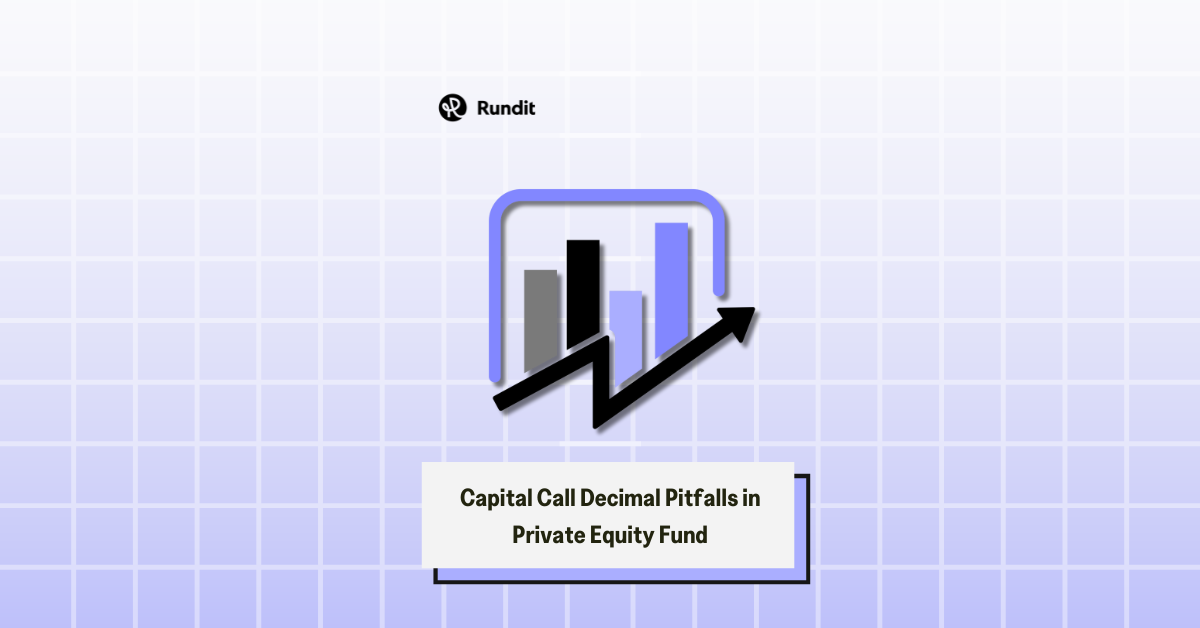
In the world of private equity, a capital call is a request made by an investment fund to its investors to transfer committed funds, which are then used to finance acquisitions, operations, or investments. While capital calls are straightforward in concept, certain technical challenges arise in their execution, particularly related to decimals and rounding. These so-called “capital call decimal problems” may seem minor but can create significant issues, especially in large-scale funds.
This blog delves into these problems, how they affect private equity, and strategies to manage them effectively.
When an investor commits capital to a private equity fund, they agree to contribute a certain amount of money over time, typically in tranches, rather than all at once. These commitments are called in periodic intervals, as the fund requires them. For example, an investor might commit $10 million to a fund, and over several years, the fund issues capital calls to request portions of that amount to finance investments.
In theory, a capital call is a simple equation: multiply the total committed amount by the percentage of the capital call requested. However, in practice, the division of these amounts among a pool of investors introduces complexities, particularly when it comes to decimal places and rounding.
Consider a fund making a capital call of 10% of the total committed capital. If Investor A has committed $1,000,000, their call amount would be $100,000. For Investor B, who has committed $1,500,000, the call would be $150,000. But when we start splitting commitments across hundreds of investors with varying amounts, the issue of rounding becomes problematic. A few cents off on each calculation can cause discrepancies in the overall capital call.
1. Rounding Errors:
The most common issue arises from rounding. Most calculations involving monetary values are subject to rounding to two decimal places, as is standard with currency. For example, if the system calls 7.5326% of the committed capital, rounding to two decimal places would turn this into 7.53%. This seemingly insignificant discrepancy can lead to sizable differences when dealing with large capital amounts or numerous investors.
2. Proportional Inaccuracies:
Some investors may experience slight variations in the percentage of their capital called compared to others due to how decimals are handled. Even when discrepancies are small, this can create friction between fund managers and investors who demand precision, particularly when dealing with millions or billions of dollars.
3. Aggregated Errors:
A small rounding error might not seem like a big deal when considering a single investor, but across hundreds or thousands of investors, these small errors can aggregate into substantial discrepancies. These discrepancies can lead to either a shortfall in the capital raised by the fund or an over-collection, requiring either another capital call or a refund process to correct.
4. International Currencies:
For funds dealing with international investors, currency conversions introduce another layer of complexity. Different currencies have different rounding conventions, which can compound the issues when converting the capital call amount from one currency to another.
Even small inaccuracies can have significant consequences. These include:
Subscribe to our newsletter
Sign up to receive our newsletter for exclusive updates, insights, and exciting news delivered straight to your inbox.
Fortunately, there are strategies that private equity firms can use to minimize the impact of decimal issues in capital calls.
1. Standardize Rounding Practices:
Funds can create internal policies for standardizing how capital calls are calculated and rounded. By ensuring that all calculations follow the same rules, funds can minimize discrepancies across investors.
2. Use Precise Accounting Systems:
Advanced accounting software can handle complex capital call calculations and reduce the chance of error. These systems can also track decimal points more accurately across a large investor base, helping to mitigate the aggregation of rounding errors.
3. Communicate Clearly with Investors:
Transparency can go a long way in managing investor expectations. Fund managers can explain how rounding and decimals are handled in capital calls to prevent misunderstandings and reduce dissatisfaction.
4. Regular Audits and Reviews:
Regular audits of capital call processes help identify and correct decimal-related problems early, before they become larger issues. This includes reviewing currency conversions for international investors.
5. Buffer for Errors:
Some funds create a buffer to account for small decimal discrepancies. By slightly overestimating the amount requested from investors, funds ensure they meet their capital needs even if small rounding errors occur.
Capital call decimal problems are technical, yet important, challenges in private equity fund management. By implementing better accounting systems, standardized rounding practices, and clear communication strategies, private equity firms can minimize these issues and ensure accurate, efficient capital raising. This not only enhances operational efficiency but also fosters trust with investors, which is critical in the competitive landscape of private equity.
Rundit takes the complexity out of private equity fund management by providing a comprehensive platform that automates key tasks, such as performance tracking, reporting, and investor updates. Our user-friendly interface allows you to effortlessly monitor essential metrics like hurdle rates, fund thresholds, and distributions, ensuring your fund remains compliant and efficient. With real-time data and customizable reporting features, Rundit helps you deliver accurate, transparent insights to your investors, fostering trust and improving engagement.
Ready to see how Rundit can support your private equity operations? – schedule a call with us!